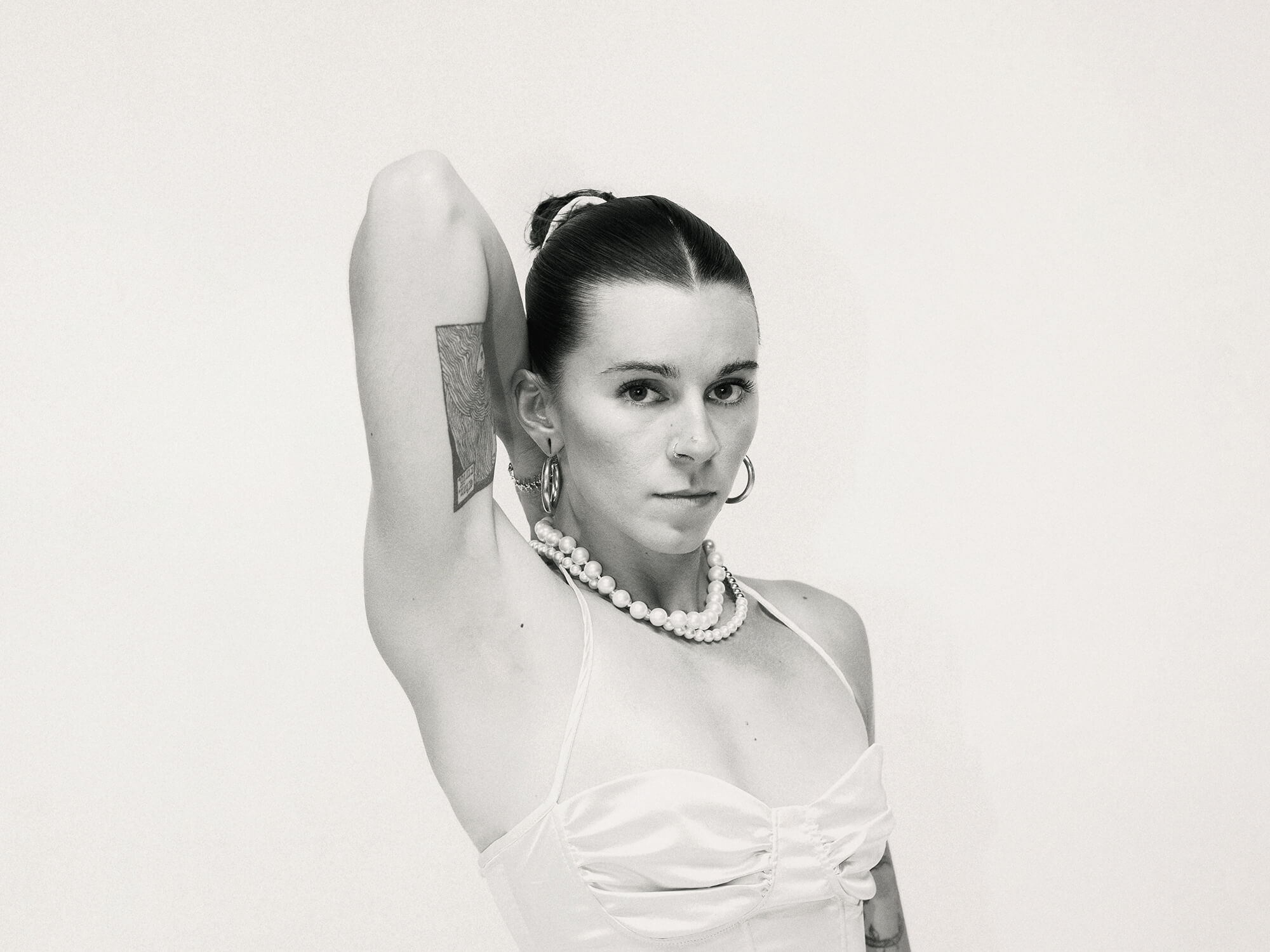Related Tags
“This can’t be that serious”: PVRIS’ Lynn Gunn embraces playfulness on Evergreen
The PVRIS multi-instrumentalist speaks about navigating genres, learning to love classical guitars, and decapitating herself on the album cover

Image: India Fleming
Before shooting the intense video for aggressive in-between-album single Monster, PVRIS’ Lynn Gunn (aka Lyndsey Gunnulfsen) was at work on a different kind of creature.
“I woke up early, just because I was kind of nervous for it,” she says. “And I wanted something to chill out. So I hopped on my computer, and started an idea.”
Speaking over Zoom during the band’s recent run of UK in-stores following appearances at Slam Dunk Festival, she explains how that idea turned into Hype Zombies, one of the darker songs on PVRIS’ recently released fourth album, Evergreen. The album encapsulates a back and forth between extremes, both musically and thematically: aggressive and ethereal, artificial versus organic – whether that’s interweaving synths and live guitars or exploring the gap between what comes across on social media and life offline.
“I think conceptually, there are some songs that reference your ego, and that song to me feels like the dark side of your ego talking and having a voice and it’s a zombie and it’s crawling,” she explains. “So it felt like it fit in thematically as well, as this really heavy moment of something’s coming back for revenge.”

Hype Zombies happens to contain some of the heaviest guitar on the album, which is juxtaposed against Gunn’s hip-hop flair when singing the melody. “I think the beat was asking for a bit more of a hip-hop cadence vocally, a bit more rhythmic and just tighter and locked in with it,” she says.
That mixing of rock and hip hop runs through the album – down to the process of recording live instrumentation and combining it with what Gunn calls, “a hip-hop sampling approach.” One example of that is bold single Animal, which, with the exception of a bass synth, is composed entirely of organic instrumentation. “It’s really dry and punchy,” she says. “Basically, we tracked live drums, and then we chopped it up, and essentially treated those like sample sounds.”
Since their debut album White Noise, which combined elements of pop, rock and electronic music, PVRIS have crafted a sound that melds together multiple styles, embracing the freedom and creativity offered by going beyond genre confines. On Evergreen, Gunn looked outside of rock music for influences, and then tried to find a way to ground it within rock.
She shared production duties on Evergreen with several producers, including Mike Shinoda, who a friend connected her to. He ended up working on confident and catchy Take My Nirvana. “Linkin Park was a really cool hybrid of rock, metal, hip-hop, rap, pop, electronic,” Gunnulfsen says. “So I think it was really cool getting to work with him just in that sense, too. Because I feel like with PVRIS, it’s never been one thing. It’s always been a bit of an enigma and dance with different genres and different styles.”
Classical Gas
Gunn started playing guitar around age eight, inspired by her older brother who had started learning the instrument through the music programs at his middle school. “I really wanted to be just like him and do the same thing,” she says. “So when he eventually saved up and got a guitar, I would sneak into his room after I got home from school, before he did, and play it for a little bit.” She later did the same thing with her brother’s drum set, and when she started middle school, played the “beat up” classical guitars the music program had on hand.
Since PVRIS’ third album Use Me, Gunn has handled playing all of the instruments on the records. It started mainly out of convenience, with others not being in the same location. For her, a song can start on any instrument. “I always really love the production aspect and creating a vibe of a track before I even start writing the song,” she says.“Just because for me, I’m thinking about that as much as I’m thinking about the writing.”
When recording guitars and using pedals, a lot of it comes down to trial and error. (“I’m not a huge gearhead,” Gunn confesses. “I just kind of see shit and try it and stuff happens.”) She experimented with co-producer JT Daly’s large selection of pedals, even using them on vocals and synths.

Gunn ended up using more classical guitars on this album. “It’s something I’ve always avoided for some reason,” she says. “I’d never really had a good nylon-string guitar to play on and in JT’s studio, he had a really nice one. And it was so easy to play on and so I naturally was starting songs on that.” It helped to capture the more ethereal side of Evergreen, particularly on the dreamy track Anywhere But Here and dynamic Headlights.
“It has made its way into my heart as a fun sound to use production-wise,” she says. But it’s had even more personal significance to her life. “Recently, I was gifted my partner’s guitar from when she was a kid and it’s a three-quarter size guitar,” she says. “It’s tiny, but I restrung it and fixed some of the parts with it and it’s playable now. And that’s kind of my favourite thing now. And again, it’s a nylon string and wasn’t something I’d usually gravitate to playing but I love it.”
Room for humour

For Evergreen, Gunn decided to have a little more fun. It may seem like a bit of a contrast to the band’s historically sombre aesthetic, but PVRIS fans will recognize Gunn and bassist Brian MacDonald’s personalities and sense of humour in it. “Ninety-nine percent of our friendship is just laughing and sending each other memes and videos,” she says. “It’s always been a very big part of PVRIS, but never an outward thing. I think right now, more than ever, as things are getting progressively scarier and darker in the world, I think there is a need for some levity and some humour in spite of that.”
Despite feeling differently earlier in her career, she’s developed a willingness to not take herself too seriously, which comes through on the record. “As the years have gone on, and more and more ridiculous shit has happened, I’m just like, ‘This can’t be that serious,’” she laughs. “It feels like finally letting that go too which is really freeing and feels great.”
That outlook even made its way to the album cover, which features Gunn’s severed head wearing a comically surprised expression. “It feels like the sentiment of it is also facing yourself and not taking yourself too seriously and taking ownership of yourself in a way,” she says.
Tying back into the album’s core themes of contrast, specifically when it comes to synthetic versus authentic, the artwork also allowed her to confront varying impressions of herself. “I feel like being a face of something or a public-facing thing has always been really strange to me, and it feels weirder and weirder, the older I’m getting and the longer I’m doing this… To do that felt cathartic in a sense of like, ‘Okay, here’s an idea of me. I’m just gonna decapitate it completely.’ My idea of myself and your idea of myself – it’s all different,” she says. On the cover, moss leaks from her neck – a nod to the title in its natural sense, while on the record Gunn was also thinking about timelessness and going against a culture of instant gratification.
Even when Evergreen tackles more serious subjects, there’s room for playfulness as well. Propulsive Goddess, with its unexpected moments – a grunt and a laugh from Gunn in the intro, her talk-singing “I’m a motherfucking brand” when the music cuts out and shouting “so exhausting!” — reflects that. “It’s very much supposed to be a fun song that you put on with your friends and you feel good no matter what body you’re in, what you identify as,” she says.
But it came to life against the backdrop of discussions about gender and autonomy and has only become more relevant since. Gunnulfsen wrote the song, “before Roe v. Wade got overturned, but that was still a thing looming over,” she says. “It was actually around the time when a lot of people had started talking about the situation with Britney Spears. So that was heavy on my mind as far as that experience and women not having full control over their decisions and bodies.”

It all comes together to form a powerful statement. “I think women taking control of their bodies… and talking about that is political in itself. And women feeling good in their bodies or female-identifying people in their bodies – that is just as political,” she says. “So it’s a pump-up song to make you feel good and feel free and empowered but to me that in itself is really important.”
PVRIS’ Evergreen is out now
